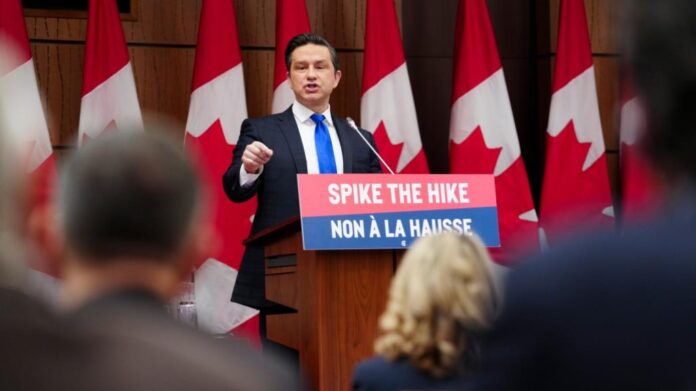Conservative Leader Pierre Poilievre called for Prime Minister Justin Trudeau to suspend the annual carbon tax increase which will go into effect April 1. During a speech at a Conservative caucus meeting on Parliament Hill on Mar. 20, Poilievre threatened to introduce a motion of non-confidence if the Prime Minister did not comply, claiming that “Canadians cannot afford to eat, heat, and house themselves.”
If a vote of non-confidence passes, the Prime Minister has two options: resign, or request that the Governor General dissolve parliament and call a general election. Essentially, Poilievre attempted to use the carbon tax’s unpopularity to instigate an election. He stated before his national caucus that the motion would read, “that the House declare non-confidence in the Prime Minister and his costly government … and call for the House to be dissolved so Canadians can vote in a carbon tax election.”
The Trudeau government’s carbon pricing policy — implemented with the aim of combating climate change — was first introduced in 2019 and has since been opposed by most Canadian provinces. Last year, the government introduced a three-year carbon tax exemption for heating oil in an attempt to relieve those residing in rural areas, however, the move was widely criticized.
Currently, the carbon pricing is set at $65 per tonne of carbon emissions. As of April 1, it will increase 23 per cent, to $80 a tonne. It is set to rise annually by $15 until it gets to $170 a tonne by 2030. Federal Conservatives have been criticizing carbon pricing practically since its initial introduction. Poilievre has made promises to remove it if he is elected.
From the moment the non-confidence motion was introduced by Poilievre, it was unlikely to be successful, as the NDP sided with the current Liberal government in March 2022 under a supply-and-confidence agreement. This agreement is designed to keep Trudeau’s government in power until June 2025 in exchange for support and advancements on NDP priorities, such as pharmacare. It also means that the NDP will support the Liberals on confidence matters, including this one that Poilievre attempted to push.
On Thursday Mar. 21, the non-confidence motion and carbon tax debate was kicked off by Poilievre, who opined the current state of the country under Trudeau’s leadership. He asserted that, “inflation has battered pocketbooks and some food bank shelves are empty as people scramble to cope with high inflation.” The Liberal party attacked Poilievre’s character, claiming that he is a “climate change denier who’s intent on letting the planet burn while dismantling a tax-and-rebate program that pads people’s pockets with quarterly cheques that mostly offset the carbon levy.”
Ultimately, the Liberal government survived with the support of the NDP and Bloc Québécois, and the House of Commons ceased Poilievre’s “spike the hike” motion. Environment Minister Steven Guilbeault stated that climate change isn’t stopping and that “we can’t put climate impacts on pause.”
The Liberal party has been in power since 2015 and the next federal election is set to be held by October 2025. According to the results from recent public opinion surveys, the Conservatives would soundly defeat the Liberals if the election were held today. Reportedly, the Conservative Party said in a statement that “Justin Trudeau has created the worst economic conditions since the great depression and Canadians have lost faith in his government,” and that “only Common Sense Conservatives will axe the tax and bring home lower prices for everyone.”
Critics of the Conservative’s push to “axe the tax” are quick to point out the lack of an alternative policy to reduce carbon emissions, and cite that the revenue-neutral aspect of the carbon tax means most Canadian households will see a rebate for more than they paid in carbon pricing. However, poor messaging from the Liberals and no standardized description when rebates are deposited mean many Canadians are unaware that they’re likely to be worse off if the tax goes away.
Even with the failed outcome of Poilievre’s call for a vote of non-confidence, these recent actions suggest that Canada’s carbon tax is set to be a major issue come next election.


